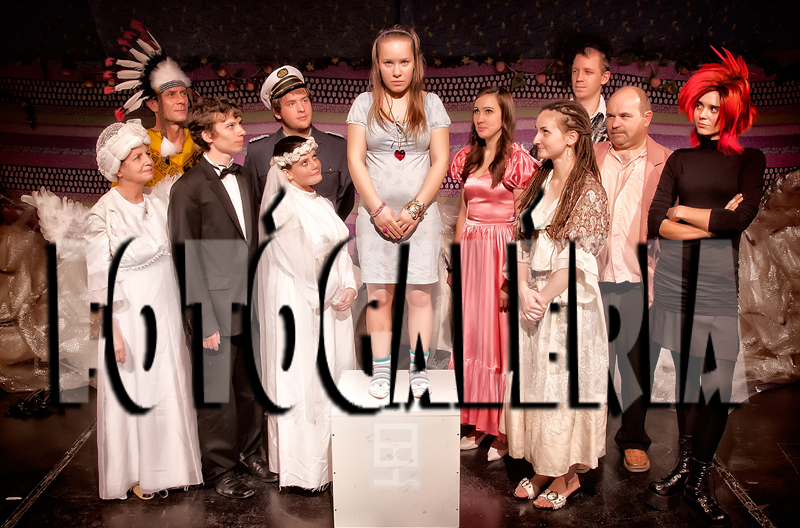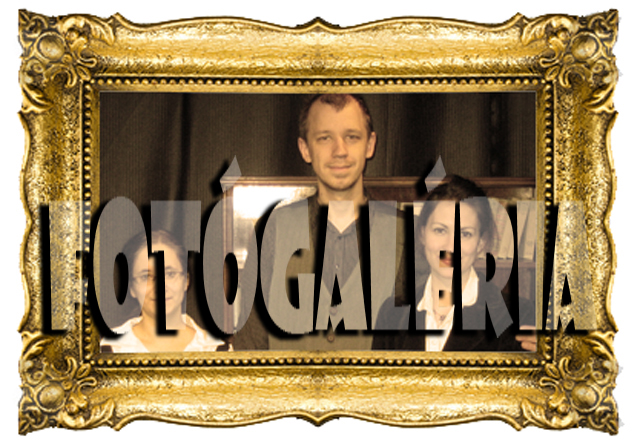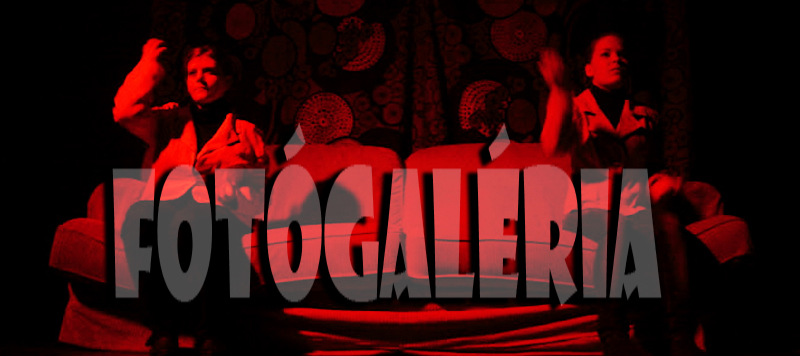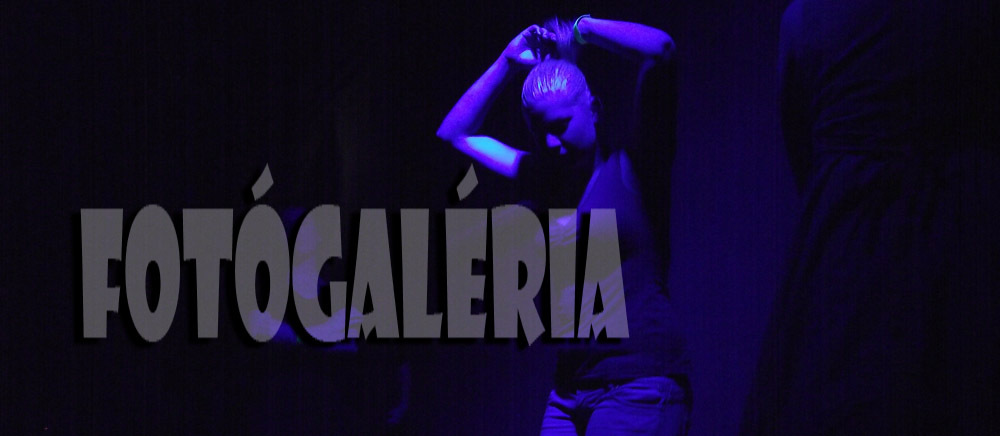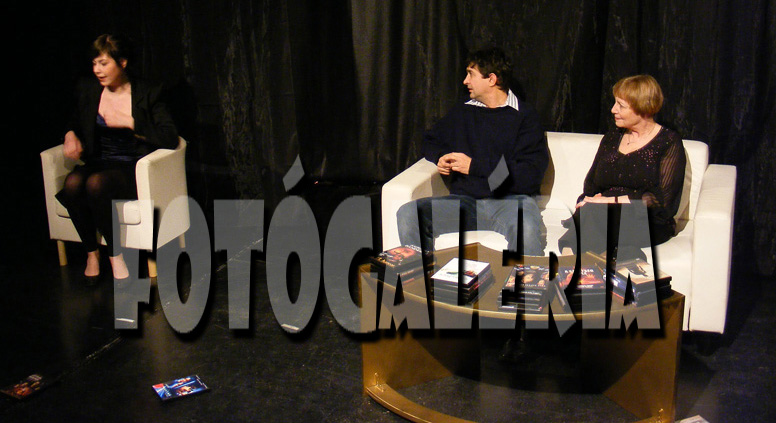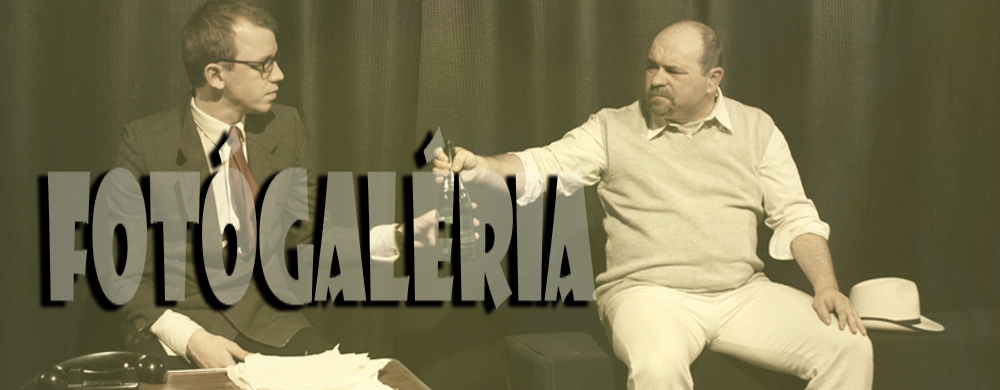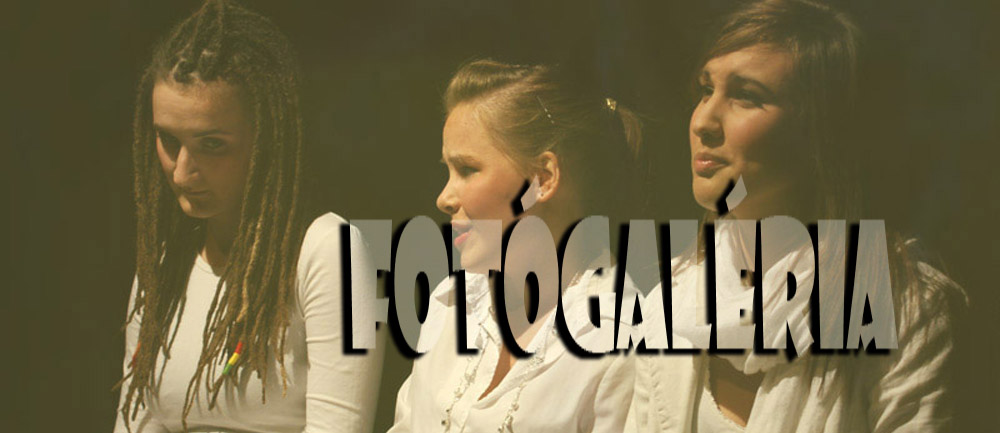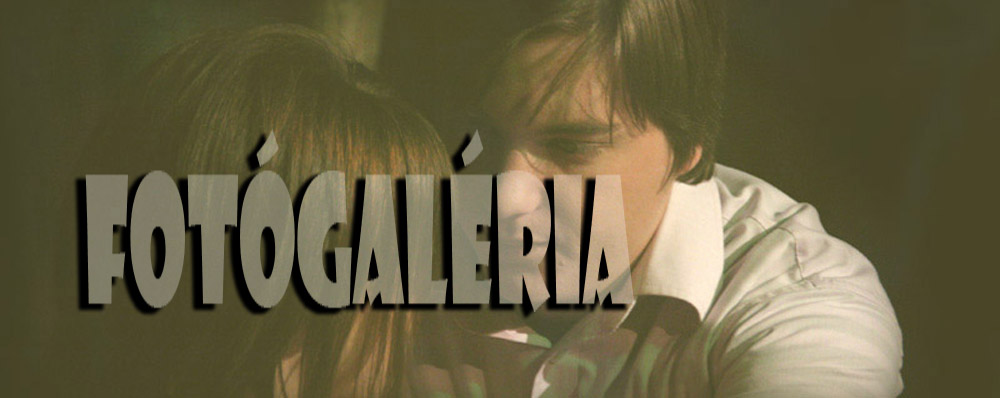|
|
| © Cziczó Attila | |||
|
|
Aha | |
(2011 - 2012) | |
|
|
(2012 - 2014) | ||
|
|
(2013 - 2014) | ||
|
|
Callgirl | |
(2015 - 2016) | |
|
|
Édes Dezsõ! / My Dear Fellow! | |
(2016 - 2017) | |
|
|
(2009 - 2010) | ||
|
|
Fém / Metal | |
(2016 - 2017) | |
|
|
(2012 - 2016) | ||
|
|
Gém / Game | |
(2016 - 2017) | |
|
|
(2011 - 2013) | ||
|
|
(2013 - 2015) | ||
|
|
Happy New York | |
(2016 - 2017) | |
|
|
(2010) | ||
|
|
(2011) | ||
|
|
(2010 - 2012) | ||
|
|
Iza és Krisztián / Iza and Christian | |
(2015 - 2017) | |
|
|
Jonatán / Jonathan | |
(2014 - 2016) | |
|
|
(2008 - 2011) | ||
|
|
K.O. [kötelezõ|olvasmány] / [required | reading] | |
(2015 - 2016) | |
|
|
(2012 - 2013) | ||
|
|
(2012 - 2013) | ||
|
|
(2010 - 2012) | ||
|
|
(2012 - 2013) | ||
|
|
(2014 - 2015) | ||
|
|
TI [Terra Incognita] | | (2011 - 2012) | |
|
|
Weekend | |
(2016) |
|
Tájbrék / Tie-break (Attila Cziczó) Tragicomedy in two acts (140 minutes) "’Tájbrék’
(Tie-break) is a contemporary drama by Attila Cziczó, founder
of Fészek Theatre. The absurd play was written for the occasion
and celebration of the 25th anniversary of the democratization of
Hungary and the Central European countries surrounding it. Following
the story of an average Hungarian family, we get a picture of three
different generations – this provides insight into how people
of all ages try to find their path in a young democracy. The play will have English subtitles. Gyõzõ
Pesti, middle aged hairdresser - Tamás Barabás
Pál
Fekete, man who works for the lawyer - Attila Cziczó
Alexandrine
(young) - Zsófia Miklós Music
editor - Dániel Cziczó
Az utolsó magyar / The Last of the Hungarians (Attila Cziczó) Drama in two acts (140 minutes) "Back
to the Future?" Júlia
- Veronika Sipos Movement
- Béla Stubnya
Halhatatlan / Immortal (Attila Cziczó) Drama in one act (90 minutes) "She
headed for a big battle, jumped on a horse, The
play will have English subtitles. Dönci
- Zoltán Bezerédi Music
editor - Dániel Cziczó
Romantika / Romance (Attila Cziczó) Drama in one act (110 minutes) "A
tale about an unfortunate musician who feels not only his own pinch
but even the Hungarian kid’s too. Love, misunderstanding, opposites--a
current story, only sugarcoated. Gypsies. Romas. Minority. Majority.
One is worse than the other! Worse one. How do we see them? How do
they see us? Is there really them and us? Absurd propaganda about
the ‘Hungarian’ and ‘Gypsy’ relations of today.
There is no solution: there is European Union. Not even a question.
I am just answering..." Kisgiza
- Zsanett Kohut Scenery
- Máté Horváth
Gabriella tizennégyszer / Gabriella Fourteen Times (Attila Cziczó) Drama in one act (80 minutes) “A real man wants two things: play and danger. That is why he wants the woman, as the most dangerous trinket. Nietzsche, Nietzsche, Nietzsche, Nietzsche... Men! Without a woman you are worth nothing. And I like, I like the woman’s role, indeed. How I would have liked to die with a lipstick and a mirror in my hand! I would have liked to age from a girl into a lady, from a lady into a woman. To step through life’s stairway. Instead, I became a vengeful feminist monster. Because I liked it. But at the wrong time and at the wrong place. Oh, I surely found the best way! The man whom I could admire. The idol, the deity, the icon, my private god. Whether it was love, I can’t say for sure anymore. I gave it my all. Everything. And I had the opportunity: I could sacrifice, I could sacrifice my body and soul. I found myself in a biblical tale. I could meet the devil too. A woozy and narcissistic animal-like male, suffering from inferiority, sickly self-proving with his seductions. One whom I freed fourteen times from his sufferings while spread out atop of the altar of noble aspiration with narcotic acceptance. I cannot be good anymore. Or bad either. Whom I am, that person is a stranger of society in every culture. I endured this dirty little war. I became a civil offering. I am not happy about it. I should have been a layperson! I failed. I apologize to myself. Forgive me, Gabriella!” Gabriella
- Zsófia Miklós Costumes
and set - Anikó Jendrics
Májlájt / Mylight (Attila Nyulassy) Drama in one act (70 minutes) This
isn’t the Twilight, but what if it would happen? But of course
we know that it cannot be, that vampires do not exist, but do we
believe that? What if they did? But secretly, or or not so secretly,
we all long to be in a fictional world, or in our own fictional
world. Where everything is allowed, where there are no rules, where
anything can happen, where stories can be rewritten anytime, where
everything can happen the way we imagine it. The way I imagine it--but
how many of me exist? Let’s imagine that everyone imagines
their own world, but how can all those imaginations actually manifest? Bella
/ Viki - Veronika Sipos Scenery
- Máté Horváth
A nép ellensége / An Enemy of the People (Henrik Ibsen) Drama in one act (70 minutes) Scene:
a peaceful bathing town in Norway (essentially anywhere in the world). Dr.
Thomas Stockmann - Ján Koncsol Scenery
- Máté Horváth
nem/más / no/different (Attila Cziczó) Drama in one act (80 minutes) At the end of most stories there is no summary. Conclusion. Because it is unnecessary. Stereotypical lives, stereotypical stories. Average. Everyday. Life, you know? Tough or not tough... Hm. Life doesn’t decide about you. You decide about life. About your life. Sára
- Cintia Tyroler Music
editor - Dániel Cziczó
Lifelike play in one act (50 minutes) “Boys
are talking to girls. Girls to boys. Children to adults. Adults to
children?” Karesz
- Máté Horváth Costumes
and set - Anikó Jendrics
TI [Terra Incognita] (Attila Cziczó) Drama in one act (110 minutes) History
lesson - not only for pupils!
The Good - Szabados Zsuzsa Movement
- Béla Stubnya
The
story of a party in one act (70 minutes) The
boyfriend of a girl runs off. Forever. Or at least that is what the
guy says in a hidden alley of a club. Another girl witnessed the farewell,
but promises never to tell anyone about it. She keeps her word. However,
a few days later classmates find the video of the confusing goodbye
on Youtube. It’s obvious who the suspect is, but she starts to
investigate instead of getting desperate. Meanwhile a third girl comforts
her suddenly solo classmate. She stands by her while the others direct
their pent-up anger at the girl who had to cross the school gates
alone for the first time in more than two years. In the meantime the
father of the runaway boy calls the school to inform them that his
son got ill. The pupils don’t understand what happened, but they
are aware of their own theory. Eventually the teachers find out the
truth with some help, nonetheless. The boy’s father doesn’t
want to confess. During this time the classmates destroyed their classroom,
their community, and are getting ready for the next party. The runaway
boy will be there too; he didn’t leave forever after all - but
how did he find out about the party? What will happen to the new girlfriend?
What will happen to the investigator? Will she be able to find out
in time what happened exactly? What is a youth thinking who’s
been kicked out from home? What happens to the girl whose love leaves
her and she is suddenly alone? Are there friends? Can anyone renounce
him/herself for someone else?For how long can one be hateful? For
how long can one close his/her eyes? Is there anything else besides
selfishness? The intention justifies the aiding devices, but what
is the intention? If I go down a slope, will I be able to stop? Will
I notice that I am on a slope? Am I able to accept others? Must I
take responsibility for my actions? Iluska
- Claudia Mészáros Costumes
and set - Anikó Jendrics & Attila Nyulassy
Gyenge vagyok / Broken Reed (Attila Cziczó) Drama in one act (90 minutes) The performance revolves around a deep and painful adult family tragedy, balancing on the verge of mystery and reality. Father, mother, little girl. Three lives, three fates, three seasons, three pictures. One solution. Cruel, but honest (self)confession about emotions, family, love, hatred, and revenge. War of reality and illusions. War. Peace? The crazy, the creature of impulse, and the intruder. Who is the weak one...? Lili
- Zsófia Miklós
Iskolapélda / The Despair of Teachers (Attila Cziczó) Absurd drama in one act (110 minutes) It
is an school in Hungary, with ordinary pupils, teachers, parents,
cleaning woman, secretary's office, gate-keeper, lessons, breaks,
field trips, parent-teacher meetings, and a collapse at the end--as
it usually happens nowadays. There are well-known stereotypes, archetypes,
and clichés.
Iván Ivánovics / rector - Ján Koncsol Costumes
and set - Anikó Jendrics
Mûköröm / Manicure (Attila Cziczó) Drama in one act (60 minutes) This
drama deals with today’s most determinative problem area. From
the dreams and wishes and the abruptly-in-their-faces-reality of students
who suddenly became self-confident adults after high-school graduation
unfolds the sad reality: life is sometimes unfair. Even when it is
fair. Ida
- Veronika Sipos Costumes
and set - Anikó Jendrics
HáRoMnõVÉr / ThreeSisterS (Anton Pavlovich Chekhov) Comedy in one act (90 minutes) The
ThreeSisterS is a youth theatre's stage adaptation of Chekhov's classic,
a series of etudes, using a well-known story for a game in which children
try to get used to the idea of becoming adults. We are not putting
three sisters on the stage; we get a taste of quintessences only;
we use a strong, everlasting wall for our graffiti where Olga, Masha
and Irina could possibly be Anna, Nanni or Zsófi as well. We
are not striving for an explanation. For us lyre is a method that
disciplines, as well as establishes achiavable goals for the hesitant
or scared young actors who are at the threshold of adulthood. Olga
- Anna Herczeg Scenery
- Anikó Jendrics
in co-production with New Theatre of Budapest Drama in one act (90 minutes) It's
the story of Lola and Sam, their eighteen years together which appears
on stage in two possible ways: with Stella, their child, or without
her. The drama's title - 'Fém' - in Hungarian is a play on words; its meaning is metal. However, when pronounced, it sounds like the English word 'fame'. This is no accident, since our play's message is the stark reality of adulthood combined with young people's dreams about fame. The play will have English subtitles. Lola
- Anna Herczeg Costumes
and set - Anikó Jendrics
Káélet / F'ing Life (Attila Cziczó) Drama in one act (70 minutes) What
can a 21st-century youth can expect when s/he first faces reality:
I became an adult? Henry
/ Andris - András Herczeg Guitar player - Attila Cziczó Scenery
- Anikó Jendrics & Máté Horváth |


